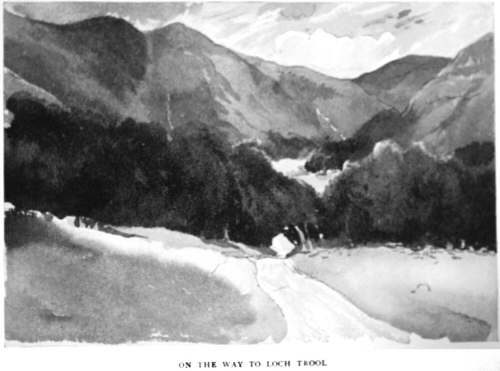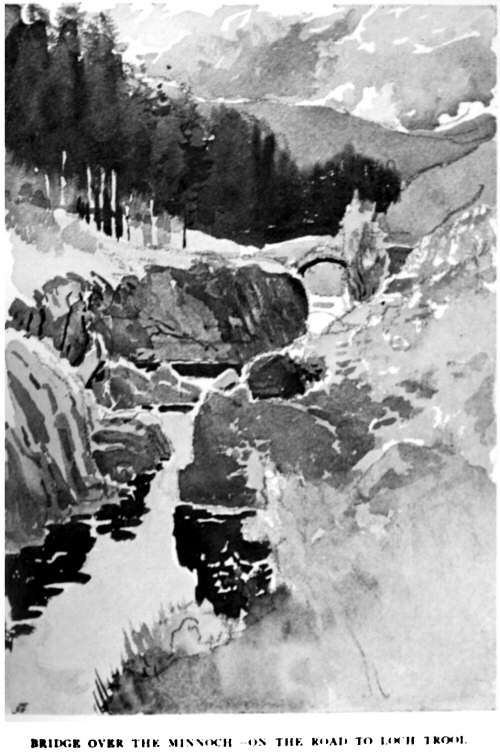|
GLEN TROOL
"FAR hae I wandered and mickle hae I seen!“ But I hold to
it that in the world there is nothing much more beautiful and various in its
beauty than Glen Trool, from the Mennoch bridge to the highest waters of
Glenhead Bum.
Yet just because it is so beautiful and changeful, it is
difficult to describe. It does not lend itself to a single impression like
Enoch or Loch Dee. There is something homely, cultivated, comfortable even,
about its wildness. Yet there is the expectation of the Romantic in the air.
As I go upward through the copses, I always glance right and left for a camp
like that of Silver Sand upon Rathan shore.
“Silver
Sand.”
"When I came in sight of the encampment I usually ran, for
there I would see Silver Sand pottering about in front of his bit tent, with
a frying-pan or a little black cannikin hung above his fire from three
crooked poles in the fashion he had learned from the Gipsies. Whenever I
think of Paradise, to this day my mind runs on Gipsy poles, and a clear
stream birling down among trees of birk and ash that cower in the hollow of
the glen from the south-west wind, and of Silver Sand frying Loch Grannoch
trout upon a skirling pan." 1
Somehow, too, I always think of Trool as first I saw it,
tremulous with broad Bashing lights, reftected from the great cumulus clouds
of a perfect summer day. But Trool has other moods, and her winter (ace is
by no means her least
1 “ The Raiders," p. 64. (T. Fisher Unwin.)
attractive. Listen to Mr. Patrick Heron, who in his younger
days knew the district well :–
"The yellow mist packed itself dense and clammy about us as
we advanced. It had ,a wersh [raw], unkindly feeling about it, and as we
rose higher up the water of Trool it hung in fleecy waves and drifts against
the brow of the hills. But what I liked least was the awesome darkness of
the sky. The mist was almost white against it wherever there was a break,
yet itself was dark and lowering. A dismal, uncanny light that I cared not
to look upon, pursued us and just enabled us to see.”
It is worth while to adventure Trool thus, in the gloom of
an oncoming snowstorm. The glen grows all, indigo blue, crossed with wisps
and streamers of whirling white. Beneath the loch lies black as night in the
trough at the bottom of its precipices. You throw a stone down from a
projecting and of roadway, and it is lost to sight long before it reaches
the water. Then, to quote Mr. Patrick again–
"The snow flew thicker, but in a curious, uncertain way, as
though little breezes were blowing it back from the ground. A flake would
fall softly down till it neared the earth, then suddenly reel and swirl,
rising again with a tossing motion as when a child blows a feather into the
air.
"As we went along the pale purple branches 'o( the trees
grew fuzzy with rime, which thickened till every tree was a wintry image of
itself carved in whitest marble." 1
Here is little change indeed, since the days of the
Raiders. Yonder torrent glimmering white before us, whose roaring reaches
the ear from far, is the Gairland Burn, and the path up its side is no
better than of yore. That little low-lying isle in the water at the head of
Trool is called Gale Island unto this day. The whaups still pipe overhead.
The peats for winter use are stacked by the wayside, and the birds sing as
of old in the fringing brushwood about the little bridges.
1 " The Raiders." p. 335. (T. Fisher Unwin.}

Standing above Earl Randolph's bridge I too have seen "the
morning star burning golden-white in a violet sky." But all these things are
only truly appreciated by dwellers as distinguished from visitors–which
makes me fear that many who come to Trool and the country of the lochs
solely for a summer day's jaunt, may return with the impression that I
exaggerate the wonders of the Raiders' Country. But it is not so. Any
shepherd with an open eye will tell you (or at least can tell you) far more
wonderful things concerning it than any I have written.
There are pleasant quarters at "The House of the Hill," and
much may be seen from there. But still, that is twelve good miles from Enoch
and the Dungeon of Buchan, and altogether the old fastness keeps its secret
well. Only to the stout of heart and the strong of limb is it granted to
enter in and take possession.
Now at long and last we are out on the "wide good road,"
along which we can set our faces towards Newton-Stewart and Cree Bridge. As
of old there are pleasant farm-houses about us, where the cocks are crowing
near and far, and the blue reek goes up very friendly into the sunshine–and
the name of one of these is still Borgan, "not far from a bridge where the
waters come down tumbling white."
Newton-Stewart.
Of Newton-Stewart and of Creetown I have little to say. The
former is the natural gateway and distributing point for much enchanted
ground. It has good hotels, clean streets, and contains one of the most
intellectual populations in the south. It was one of the last strongholds of
Cameronianism in Galloway, and as a boy I learned much from the minister of
Creebridge, the Rev. James Goold. But, to tell the truth, I am never easy in
a town, even in a small one. I prefer to be out with Sweetheart on the
spinning wheel, or a-foot on the heather with a staff in my hand and a
camera on my back. Therefore let us be off!
“Soon we are crossing a pleasant land open to the south and
the sun, with cornfields blinking in the hazy light, and reaping-machines'
gnarring , and clicking cheerfully on every slope. Past Ravenshall we go,
where the latest Scottish representative of the Chough or Red-legged Crow
were, a few.years ago, still to be found–a beautiful but unenterprising
bird, long since shouldered out of his once wide fields and lordships by the
rusty underbred democracy of the Rook. A little streamlet '’seeps' its way
down through the ambient granite. It is sacred to the memory of a good man,
who for years carried his drinking-cup in his pocket that he might use it
here. It is the very spot. Ah! no more will Sir James Caird, greatest of
agriculturists and most lovable of men, pursue his pastoral avocations–
‘watering his flocks,' as he loved to say, by taking out his guests to taste
'the best water in the Stewartry,' at this favoured well by the wayside.
"Refreshed by a draught, we mounted again and the long
clean street of the Ferry town sinks behind us. We climb; up and, up till we
find ourselves immediately beneath the Creetown railway station, where
signals in battle array are flanked against the sky; then down a long
descent to the shore levels at Palnure. It is now nearly four in the
afternoon, and we pause at the entrance of the long hill road to New
Galloway, uncertain whether to attempt it or no. A man drives along in a
light spring-cart. Of him we inquire regarding the state of the road.
" 'Ye're never thinkin' o' takin' that bairn that lang
weary road this nicht?' he asks.
" It seems that the road is fatally cut up with the carting
of wood, that much is a mere moorland track, and the rest of it unridable.
This might do for a man, but it will not do for outr little Sweetheart at
four o'clock of a September day. Therefore we thank our informant, who races
us, unsuccessfully but good-humouredly, along the fine level road toward
Newton=Stewart, which smokes placidly in its beautiful valley as the
goodwives put on the kettles for their 'Four-hours" tea. .
“Here we are just in time to wait half-an-hour for the
train –as usual. During this period the Little Maid became exceedingly
friendly with every one. She went and interviewed a

very affable station-master, hand in hand with whom she
paraded the platform as if she had known him intimately all her life."
1
There is, besides, at Newton-Stewart, a lovely walk up to
the Parish Kirk of Minnigaff, one of the most picturesquely situated in
Galloway. Also the surroundings are kept with much taste and feeling for
natural fitness. I do not know who is responsible for this, but whosoever it
may be, I make them or him my very respectful compliments. It was not always
thus–in so far at least as the clachan is concerned. Minnigaff is now only a
pretty, wholly original suburb of Newton-Stewart. But it is far older than
its neighbour across the way, and for long resisted the march of
improvement.
Something like this was its condition at the time of "The
Levellers. "
Minnigaff.
"The clachan of Minnigaff," writes the chronicler, "was
certainly one of the most ancient in Galloway, and at that time it resembled
nothing so much as a boulder-strewn hillside, with the spaces between the
blocks of stone rudely roofed over and thatched with brown heather and
yellow oat-straw. A few of these huts had their gables to the road which
passed through up the left bank of the Water of Cree, but the greater number
were set at any angle, as if showered from a pepper-castor.
" But whether duly oriented or dispersed at random, every
domicile possessed another and often far larger erection before its door.
This was the family midden–those edifices which in these latter days wise
men have begun to study for what they tell of the life of the folk of bygone
ages, but which, when considered contemporaneously and by means of the
ordinary senses, are not pleasant objects for prolonged contemplation. These
Minnigaff middens, I say, were in nearly every case larger than the parent
house, or compound of dwelling and cattle-shed, whose inhabitants, human and
bestial, had supplied the materials for its erection. Most of these
1 “Sweetheart Travellers," p. 28. (Wells Gardner. Darton &
Co.)
middens, also, were set like mountainous islands in a sea of
liquid green filth, where ducks dabbled and squattered all day, and in which
patient calves stood winking the flies from their inflamed eyes, or to all
appearance enjoying the coolness and the light aromatic breezes, as much as
though they had been chewing the cud knee-deep in some rippling river' or
lily-bordered lake." |

